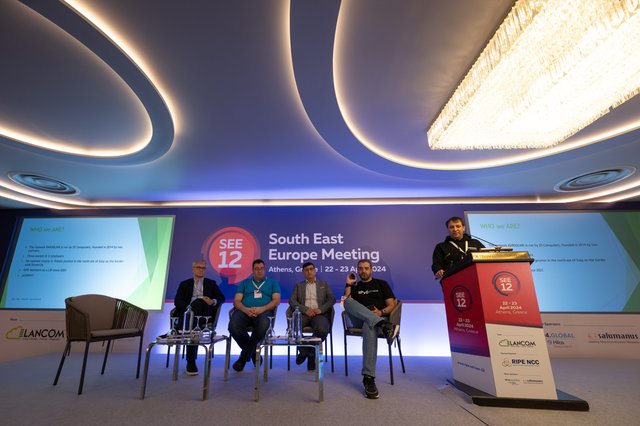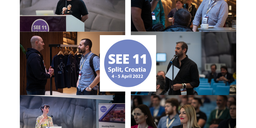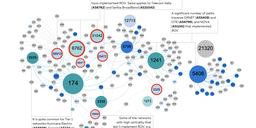On 22-23 April, the South East Europe (SEE) Internet community came together in Athens - the first time a SEE meeting has been held in Greece! 195 participants from 26 countries joined to discuss the history of the Internet, IPv6, RPKI, BGP and more.
Before we got started with the engaging agenda, participants gathered for a workshop on Global Routing Security for Practitioners that focused on Border Gateway Protocol (BGP), which is crucial for the safe operation of the internet's underlying routing structure. The workshop touched on numerous facets of routing security, including the insecurities of BGP, proposals for new protocols, and the implementation and performance of security enhancements like BGPsec and RPKI.
The Internet Pioneers: EARN panel
40 years ago, the organisation called the European Academic and Research Network (EARN), started as the first multi-vendor computer communications network in Europe – all before the Internet became widely available. Some of the Internet pioneers who stood at the beginning of EARN; Dennis Jennings, Daniele Bovio, Daniel Karrenberg and Niall O'Reilly talked about how it all started and what lessons they learnt building the network of networks available for the research community across Europe and beyond.
From telephone company monopolies to the free market and an Internet accessible to all, they reflected on pivotal moments in the Internet’s history. We also spoke with some of the panellists for the RIPE Labs Podcast to discover more about the beginning of the Internet. Stay tuned for the release of the episode.
In the meantime you can watch the panel on YouTube.
Unlocking SEE: Telecommunications Developments
A central topic across presentations at SEE 12 was looking at Internet technology developments across the SEE region. This kicked off with a presentation from George Nolis on why Greece is the new telecoms gateway and continued with a delve into usage patterns from IXP Public Shared Traffic Data across SEE Countries with Gianluca Sironi, 30 years of security collaboration in Europe with Silvio Oertli and a panel discussion on IPv6 adoption.
IPv6 Adoption in South East Europe: A Panel

During the panel on IPv6 deployment, Qasim Lone from the RIPE NCC provided an overview of the trends in the adoption of Internet technologies across the region, mainly IPv6 and routing security. He shared the results of the research that was published on RIPE Labs.
During a comprehensive panel discussion, Vasja Križmančič shared insights from implementing IPv6 at a small ISP in northeastern Italy. Vasja highlighted that the primary motivations for adopting IPv6 included improving service quality and reducing network complexity.
Challenges in the deployment process included updating customer premise equipment to support IPv6, dealing with vendor-specific issues, and the need for educating local IT staff about the benefits of IPv6. The transition yielded significant benefits, such as reduced IPv4 traffic and enhanced network performance and efficiency.
Panellists discussed regional experiences and challenges related to IPv6 deployment. Georgios Manousakis elaborated on dual-stack services in mobile and fixed networks, emphasising challenges with customer equipment readiness. Pavle Mijušković shared Montenegro's national efforts to promote IPv6, including government initiatives and the struggle with low demand and high deployment costs.
Across discussions, a common theme was the importance of government role and regulatory challenges in accelerating IPv6 adoption. There was consensus on the necessity of more aggressive promotion of IPv6 through incentives and possibly regulatory mandates to overcome the slow voluntary uptake observed in various regions.
Wrapping up, we want to thank our host Lancom and the South East Europe Internet community for welcoming us in Greece!
Watch the full recording of the event here.
For updates in the region and future events, follow the SEE Regional Mailing list.









Comments 0